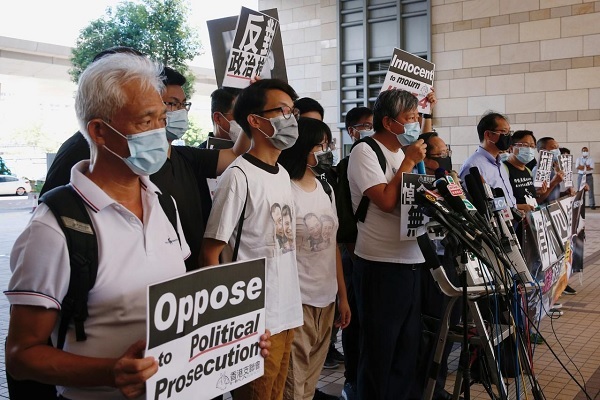Beijing's Hong Kong Office Warns Pro-democracy Poll Could Violate New Security Law
Tue 14 Jul 2020, 17:04:26

Beijing's top representative office in Hong Kong has warned the pro-democracy opposition's primary elections at the weekend could violate a new national security law, exacerbating concerns over a crackdown on the former British colony's democracy movement.
Preliminary results showed a group of young democrats, or "localists", performed strongly in the elections that drew more than 600,000 votes, reflecting a potential change of guard to a more radical grouping likely to rile authorities in Beijing.
The primary polls are aimed at selecting democracy candidates who stand the best chance of success in September elections for the Legislative Council, Hong Kong's governing body. Final results are due later on Tuesday.
Many observers see the election as a symbolic protest vote against the tough new security law that punishes what Beijing broadly defines as subversion, secession, terrorism and collusion with foreign forces with up to life in prison.
"The objective of coordinator Benny Tai and the restriction camp is to hold onto the decision intensity of Hong Kong and ... complete a Hong Kong variant of 'shading insurgency'," a representative for the Liaison Office said in an announcement not long before 12 PM on Monday.
Luo Huining, the top of the Liaison Office, will have oversight over the execution of the petulant security law that will likewise permit territory security specialists to be authoritatively situated in China's freest city just
because.
because.
Pundits of the law dread it will smash wide-extending opportunities vowed to Hong Kong when it came back to Chinese guideline in 1997, while supporters state it will carry soundness to the city following a time of some of the time fierce enemy of government fights.
The law has drawn judgment from Western countries, with the European Union saying on Monday it is taking a shot at measures to rebuff Beijing for the move, including a potential survey of EU governments' removal bargains' with the money related center and offering more visas to its residents.
The law has also seen countries such as Britain and Canada caution citizens over an increased risk of arbitrary detention in Hong Kong and possible extradition to mainland China where they could face trial in courts controlled by the Communist Party.
Australia last week said it was suspending its extradition treaty with Hong Kong due to the security law and was offering students, graduates and workers in Australia on temporary visas the opportunity to stay and work for an additional five years.
Finland said on Monday the Nordic country's extradition treaty with Hong Kong should not be applied as the security law means people could be transferred to mainland China.
The UN Special Rapporteur on freedom of opinion and expression said on Monday he was "extremely concerned" about the future of Hong Kong following the adoption of the new national security law.
No Comments For This Post, Be first to write a Comment.
Most viewed from International
Most viewed from World
AIMIM News
Latest Urdu News
Most Viewed
May 26, 2020
Do you think Canada-India relations will improve under New PM Mark Carney?
Latest Videos View All
Like Us
Home
About Us
Advertise With Us
All Polls
Epaper Archives
Privacy Policy
Contact Us
Download Etemaad App
© 2025 Etemaad Daily News, All Rights Reserved.



.jpg)






.jpg)
.jpg)








.jpg)
.jpg)
.jpg)
.jpg)
.jpg)

















